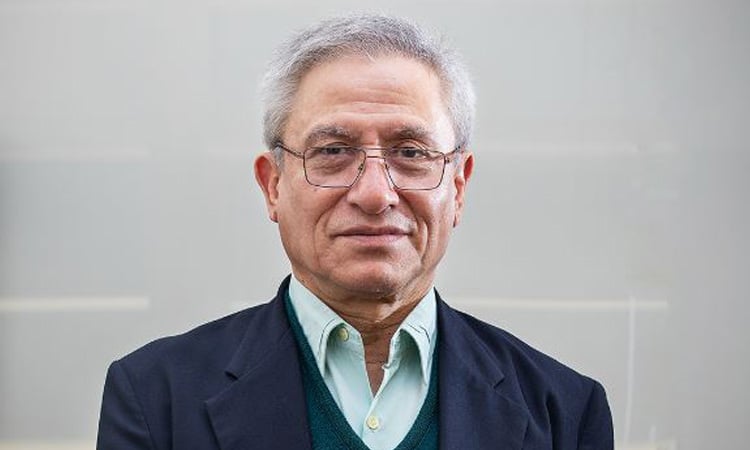News Flash
News Flash

DHAKA, Jan 23, 2025 (BSS) - Dr Zahid Hussain, former lead economist of the World Bank, Dhaka Office, and a renowned economist has expressed his hope that the economy could make a 'turnaround' if the interim government delivers one quarter of what they are expected to deliver on the economic front this year.
"We'll be able to ascertain after the next budget (FY26) what are on the cards to get the economy grow faster. If the initiatives on the table are implemented in the short-term, then hopefully the economy will make a turnaround," he said.
They promised the beginnings of Bangladesh 2.0, he said, adding in order to streamline the economy, it needs simplifying business regulations and process, ensuring uninterrupted supply of energy, and rescuing the banking sector from its sorry state.
Dr Zahid came up with the remarks while giving an interview to BSS at his residence here today.
When asked about the major barriers in the economy, the eminent economist said that there are major drags or barriers in the financial sector, energy sector, and the obstacles towards investments like business regulations.
In this regard, he appreciated the progress on National Single Window (NSW) which would eventually save time and cost of the businesses through addressing the regulatory complexities in import and export processes.
He suggested the government making sure that the digital process of licensing and certification in import and export operations remains fully functional while its transitions from manual system.
Dr Zahid said the initiative for single window did not become effective over the years due to not lack of initiatives, but for the apparent resistance from the NBR....that character remains the same.
"Unless the system becomes fully digital and trustworthy, you'll have to keep your fingers crossed," he said adding that the process is definitely heading in the right direction.
Asked about the revenue collection pace of the NBR in the current fiscal year (FY25), he said that there were no such opportunities in the first quarter (July-September) of the current fiscal since the economy was mostly dysfunctional.
"In order to boost the revenue collection, reforms are needed in the NBR especially in the tax policy and in administration," he said.
Bangladesh's revenue collection fell in November even though the country saw improvement in its business climate.
Revenue collection amounted to Taka 25,360 crore in November, down 8.95 percent compared to the same month the year prior, shows provisional data of the NBR.
On top of that, the overall revenue collection declined 2.62 percent year-on-year to Taka 130,185 crore in the July-November period of the current fiscal year (FY25).
Besides, the tax administrator was Taka 38,830 crore behind its collection target of Taka 169,015 crore for the first five months of FY25, with its end goal set at Taka 480,000 crore for the year.
Dr Zahid noted that the recent step of raising VAT and SD on over 100 products to boost revenue in a speedy manner has ostensibly backfired.
He said the move was taken apparently to appease the IMF, but now they might also be disappointed since the government is backtracking in some cases.
With such attempt, people have also become dissatisfied to some extent... not a prudent step, he added.
In this connection, the eminent economist said the government took the decision on adhoc-basis without fast tracking the FY25 budget revision through a consultative and inclusive process.
About the slow pace in Annual Development Programme (ADP) implementation, he said that various types of disasters were the reasons for this side by side there were many projects undertaken in the past out of political considerations which often waste public fund.
"They promised reprioritization of expenditures taking into cognizance the post August 5, 2024, realties. Necessary reforms are needed in this regard and faster!" he added.
Regarding possible cut in the ADP in the current fiscal, Dr Zahid said if such cut is made in the right areas through reducing misallocation and waste, then it would be better for both the current and future governments.
Several ministries have made encouraging beginnings, showing it can be done. The implementation of the ADP in the first six months of FY25 was down 19 percent year-on-year, mainly to political unrest and delay caused by thorough scrutiny of some previously approved projects.
Development spending in the July-December period amounted to Taka 50,002 crore, according to IMED.
This means that in the first half of the current fiscal year, the government spent around 18 percent of the total development outlay for FY25.
In the same period of the last fiscal year, ADP implementation stood at Taka 61,739 crore, representing over 22 percent of the total allocation.
About the utilization of huge pipeline in the foreign aid portfolio, he said it is not always the case that the foreign aided projects fare better.
Low value for money is a problem common to public projects irrespective of their sources of financing.
He said if a project is not fit for purpose, then there is no prudence in moving forward with that kind of project. "Both domestic and foreign debts in Bangladesh have been in many instances paid for waste and corruption in an industrial scale in the recent past. In such cases we are better off not borrowing", Dr Zahid said.
Referring to his recent meeting with the outgoing World Bank country director, he said that they have unused envelope that can be accessed to get cash support for structural reforms initiatives and investment support for worthy projects, even the pipeline could be repurposed.
"In many cases, the project aids are being converted to budget support ....if the existing projects could be reformed, then the pipeline of project aid would disburse faster", he added.